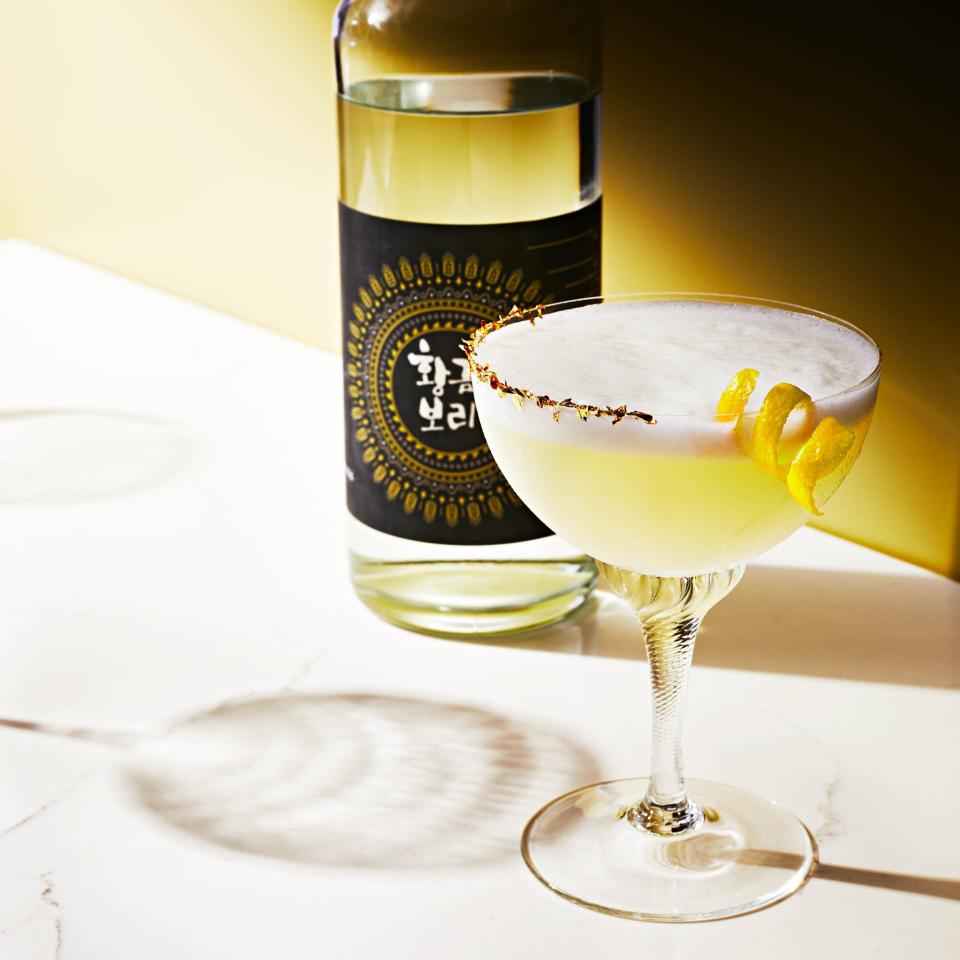Master Sommelier Kyungmoon Kim Wants You to Fall in Love with Soju

Courtesy of Bar & Dining
In the early 2000s, Kyungmoon Kim found himself teaching wine-appreciation courses on South Korean warships. Kim had moved to the States from Korea as a teen and attended the Culinary Institute of America. There, students with prior restaurant experience outpaced him in the kitchen, but he excelled in the wine class. Encouraged, he went on to complete three levels of the Wine & Spirit Education Trust certification and pass the Court of Master Sommeliers' introductory and certified exams. And then he was required to serve in the South Korean navy.
RELATED: Soju, Rice Wine and More: An Intro to Korean Spirits
"I was stuck on a base for two years, but I was determined to keep learning," he says. None of the wines in his coursework were available on the base, so he studied without tasting. He managed to win a sommelier competition in Seoul and started sharing his knowledge, offering seminars across the fleet. All the while, he was building the wine list for CIA classmate Jungsik Yim's first restaurant in Seoul, and after receiving his discharge, Kim started working there. When Yim opened Jungsik in New York City in 2011, Kim built that list, too.
Kim was enthusiastic about pairing wine with Korean cuisine. "We had close to a thousand labels," he says. But what he didn't anticipate was New Yorkers' interest in Korean drinks. In other Koreatown bars, the drink of choice was "green bottle" soju, a mass-produced spirit made with starches and additives. "I couldn't find anything I was proud to offer," he says. "But it stayed in the back of my mind."
RELATED: Why You Should Be Drinking Korean Soju Right Now
In 2016, then working at The Modern, Kim passed the Court's Master Sommelier test, wine's most elite exam. "I thought, 'Now the world is going to open up for me,'" he remembers.
It didn't. He spent a year consulting for Dragonback Estate, a membership winery, in Argentina. He considered opening his own restaurant. "Then the light bulb came on," he says. Many of the restaurateurs he knew shared a need for an artisanal Korean beverage. So Kim hopped on a plane to Korea to discover what small rice distilleries were producing.
Koreans have been brewing cheongju—rice wine—for 2,000 years and distilling it into the spirit called soju since the 13th century. But in the 20th century, Japanese occupation and the Korean War left the country destitute, and what rice there was had to be used for food. Brewing and distilling rice were outlawed. Smaller operations shuttered; bigger ones turned to other grains, tapioca, or sweet potatoes for the base of their beverages. That went on for nearly half a century.
RELATED: The Secret History of Japanese Wine
But when Kim returned to Korea, he learned that a renaissance in soju was underway. The government had lifted the ban on rice distilling in the 1990s, eventually even bestowing upon some producers the title of Intangible Cultural Heritage. Artisanal soju was back. "When I tasted it, I was blown away," Kim says. "It opened my eyes."
Unlike the industrial stuff he'd seen in New York, the craft soju Kim tried was made in small batches in pot stills, using a natural yeast starter called nuruk. Whether bottled at 20% or 40% alcohol, they offered lush textures and notes of herbs, fruits, and cherry blossoms. But few had tasted them, even within Korea. The big, cheap bottles still dominated the market.
Kim decided to help small-scale producers find a market in the United States by acting as their importer. Today, Kim brings in soju that makes an elegant substitute for vodka or gin and pairs beautifully with food. Slowly, they're gaining a following.
"Soju is the most fascinating topic that few people know anything about," Kim says. He is optimistic about its future. "A lot of people hadn't yet learned about mezcal 15 years ago. Now, every restaurant has some from a little village. We're still taking baby steps with soju. But we can definitely get something going."
Kyungmoon Kim's Picks
Find these at woorisoul.com.
Yangchon Chungju
($30)
Brewed using glutinous rice, this golden rice wine is earthy and viscous, with mushroom, marzipan, and dried-pear flavors, plus a bittersweet nut-skin finish. Enjoy it alongside Korean barbecue.
Solsongju Damsoul Pine Soju
($26)
Infused with spruce and pine, which is prized in Korea, and diluted with spruce tea, this herbaceous soju is a great swap for gin. Kim likes to stir it with Campari and Yangchon Chungju for a Korean spin on a Negroni.
Sulseam Mir Soju
($30)
Made with just water, nuruk, and rice from Gyeonggi province, this double-distilled spirit has a roasted-corn aroma and a lactic sweetness, with bright notes of pineapple and hops. It's wonderful on the rocks.
White Gold

Photo by Caitlin Bensel / Food Styling by Rishon Hanners / Prop Styling by Claire Spollen
Forever Young

Photo by Caitlin Bensel / Food Styling by Rishon Hanners / Prop Styling by Claire Spollen

